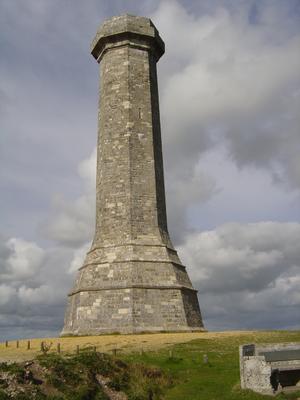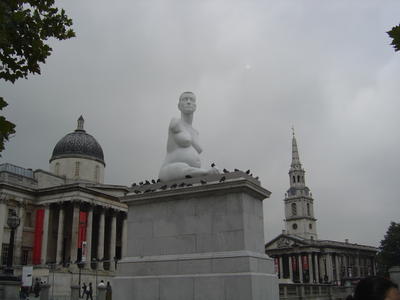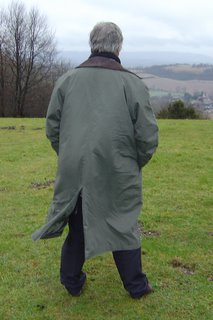I spent the whole of today looking forward to
Wednesday, October 12, 2005
Divided Loyalties
Monday, October 10, 2005
The Misunderstood Thomas Hardy
 Sunday, and the wife and I are being diverted around
Sunday, and the wife and I are being diverted around
Readers of my recent blog about First Lieutenant George Joliffe, the nineteen-year-old killed on board HMS Bellerophon at the
Poor Hardy. After the triumph of battle specially struck gold medals were awarded by the Admiralty to all the Captains who had commanded ships in the Bay of Aboukir, with the sad exception of Thomas Masterson Hardy, as he had only captained a brig.
Sunday, October 09, 2005
Crying “Fowl”
It is Saturday and I’m looking forward to the
Friday, October 07, 2005
Another Ghost Ship – The 'Billy Ruffian'
What do Cheryl Ladd and Josiah Wedgwood, Oscar Hammerstein II and Bill Cosby, Gareth Edwards and Gareth Gates, Gaby Roslin and Anna Friel, Pablo Neruda and Lionel Jospin, R. Buckminster Fuller and The Ranting Nappa all have in common? Well we were all born on “Orangemen’s Day”, that doubtful and rather nasty commemoration of the
Thursday, October 06, 2005
Ghost Ships, Ladies on Plinths, and Bookshops

To London today, to attend Linux World at Olympia for a useful hour spent as a visitor rather than as an exhibitor, and then, to my surprise, I had a free afternoon – no appointments, no ties, no responsibilities – the chance to reacquaint myself with our capital city and to see how it had changed in the eighteen-odd months that I had been away.
And, probably to the disappointment of my readers who sense a good rant a-coming, I didn’t mind the lady on the plinth at all. In fact I was curiously unaffected by her having spent a dizzy forty-five minutes reminding myself just what a great place The National Gallery is for Londoners and tourists alike. That ghostly Fighting Temeraire, the Monets and Van Goghs, the Constables and those Swimmers at Asnières; these and so many more world class paintings that I staggered out of the Sainsbury Wing exit in a bit of a daze.
I checked out the rest of Trafalgar Square and was slightly disappointed that, after so many years as a building site while the big pedestrian piazza project took shape, the Square is still a building site with large areas cordoned off. Leicester Square by contrast seemed, by day, a really pleasant, traffic-free place to stroll around. Tourist buses (the ones with open tops) have become much more modern; and there seem to be more pigeons than ever before.
And then to the bookshops. I did the mystery shopper thing in Waterstone’s, Piccadilly (which still seems more museum than bookshop, and which has lost the variety of little nookie snack areas which were a feature when it opened), to Hatchards (same, great shop for posh people and still not much good for computer books or graphic novels), and to the Charing Cross Road. Blackwell’s and Borders were pretty much unchanged, although the latter had a posse of managers arguing loudly about sight-lines. Foyles seems to improve all the time although the 20% off student promotion jarred slightly with this non-student. None of shops I visited, however, had copies on display of my test computer book (a current bestseller in a small way).
I found time to wander down Sicilian Avenue and to peer, nostalgically, through the bare windows of my still-unoccupied old store. I also had time to sit for a while on a bench on the South Bank near Waterloo Bridge. This is the place I have always gone to at moments of change in my working life. I’ll stare at the river and contemplate my most recent decision and hope I’ve chosen right. I didn’t stare at the river this time. I just reckoned that I need to find a new place to do my contemplation-thing now, as that stretch of river has never brought me much luck.
Wednesday, October 05, 2005
(Boring) Truths on Bookselling
So what would happen if we abolished speed limits in the
Saturday, October 01, 2005
Eating in France
Now a decent restaurant in France should be one of two things – expensive and worth it, or cheap and worth it. The wife and I had reached the doorway and were on the point of entering the celebrated (but mediocre) fish soup restaurant Chez Perard in the rue de Metz, ready for a “Friday night is Fish Night” sort of meal which would probably have set us back 100 euros. Blocking the doorway was the inevitable singer (complete with silly hat and inevitable rendition of “Yesterday”). At that moment we both recalled the rather poor bag of prawns for which I had paid 17 euros on a recent visit to the adjoining poissonnerie, and we backed off.
Further down the street we found a more humble establishment called A Table: Brasserie Traditionelle which appeared to major on Moules Frites but with some other stuff on a blackboard. We went in and managed to manouevre ourselves into a four-seater table by the window. We both ordered exactly the same meal – a starter of Poélée d’Ecrevisses et Moules, Beurre et Ail as scrumptious as it sounds; main course of Medaillons de Lotte in a delicious sauce of tarragon and (surprisingly) red wine, served with lentils, roast tomato and a yummy mash incorporating slices of black olive; desserts of Poire Pochée, Caramel d’Endive á la Fleur de Bière et son Glace, coffee and a bottle of house Vin Rosé between us. The bill was half of what we would have paid at Chez Perard, the service was attentive and prompt, and we left with the glow of having enjoyed a really nice meal at a sensible price.
Probably next time we go there they’ll have changed hands, doubled the prices, and fired the chef (as is the French way). I hope not.
